
Freshfel Europe Headlines – Edition 1, 2021
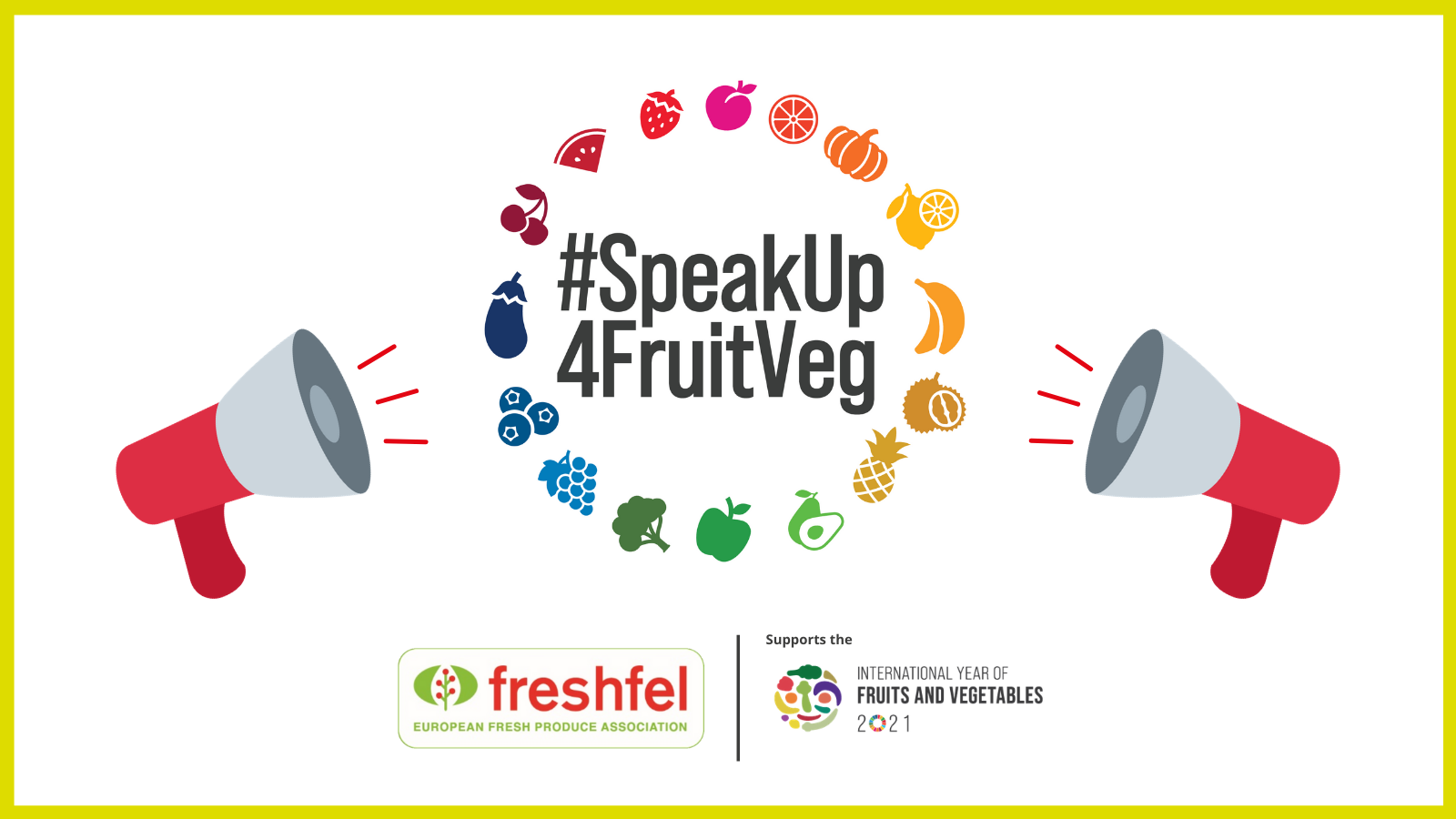
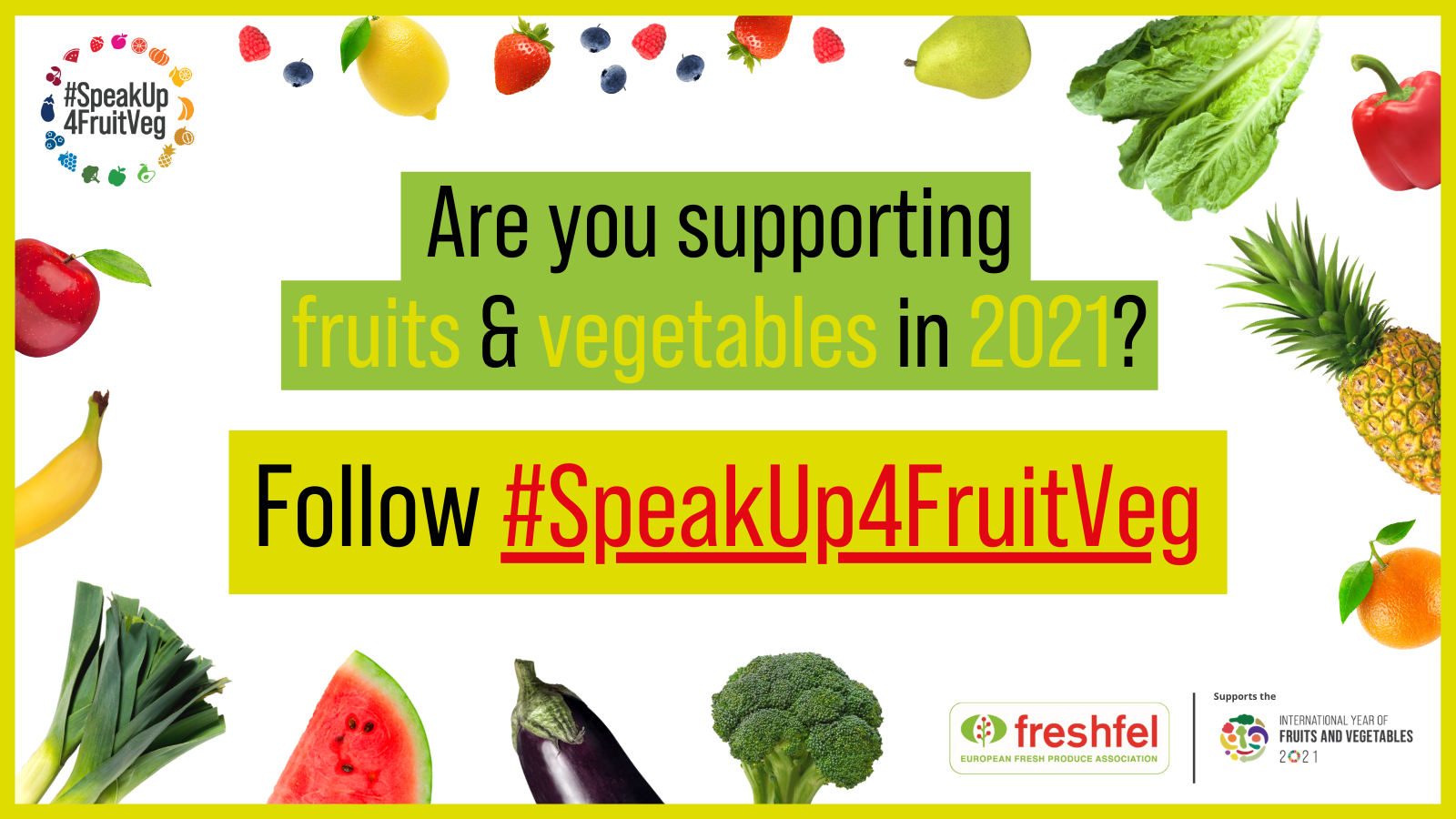
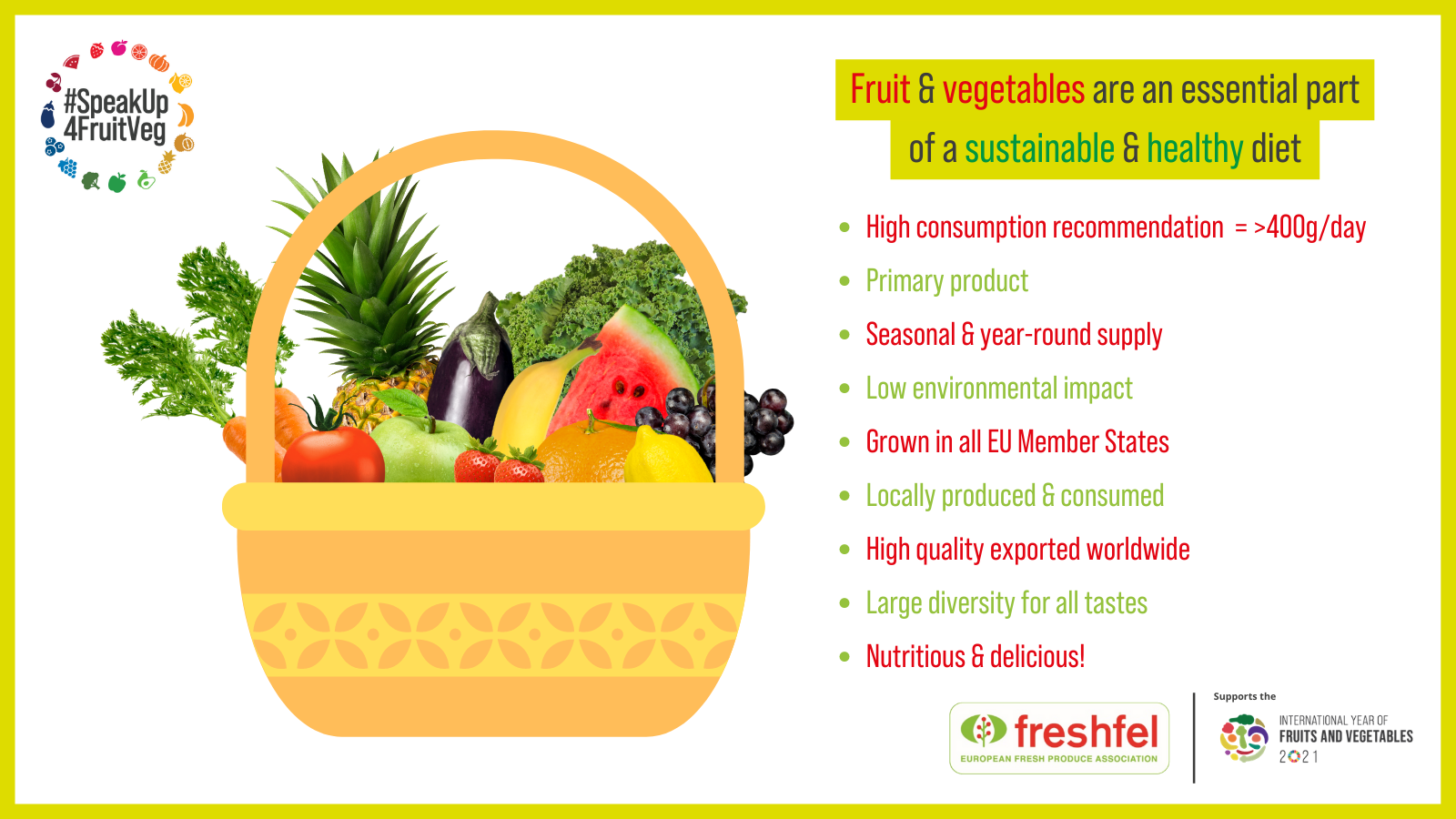
#SpeakUp4FruitVeg celebrates International Year of Fruit and Vegetables 2021
2021 has been designated by the UN General Assembly as the International Year of Fruits and Vegetables (IYFV). The IYFV is a unique opportunity to raise awareness of the important role of fruits and vegetables in human nutrition, food security and health as well as in achieving the UN Sustainable Development Goals. To support and celebrate the 2021 IYFV Freshfel Europe is running a digital campaign ‘#SpeakUp4FruitVeg’. Launched in January 2021, the campaign is targeted at EU decision-makers to better support the sector in EU policy-making. Through regular posts on its social media accounts (Twitter, LinkedIn, Facebook) throughout 2021 Freshfel Europe hopes to boost support for the sector by EU decision-makers including European Commission officials, Members of the European Parliament and Member State representatives. Further information about the #SpeakUp4FruitVeg campaign is available via the campaign launch press release and the Freshfel Europe website, otherwise please contact the Freshfel Europe Secretariat.
Freshfel Europe is encouraging the EU fruit and vegetable community and beyond to support this important international year. Freshfel Europe is calling on its members to proactively engage in the 2021 IYFV to maximize the outreach of this exceptional yearlong initiative to boost consumption and raise awareness of the sector’s constant work to improve the health of all citizens and increase global sustainability. Freshfel Europe’s press release on the launch of the 2021 IYFV is available here.
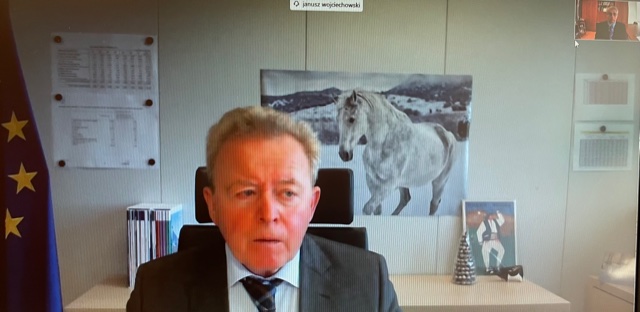

Freshfel Europe engages in dialogue with EU Agri Commissioner on the promotion policy priorities
On 13 January 2021 Freshfel Europe together with eight other European Associations met with European Agriculture Commissioner Wojciechowski to exchange perspectives and concerns about the new trends set for the Promotion Policy and the Annual Work Programmes (AWP) 2021. Freshfel Europe was represented at this meeting by its General Delegate Philippe Binard and by Simona Rubbi (CSO and Chair of the EU Civil Dialogue Group on Promotion and Quality). Freshfel Europe chaired and monitored the debate with the Commissioner. From a Freshfel Europe perspective the AWP 2021 is bringing very positive development sin its priorities driven by the Farm to Fork Strategy’s ambitions with the increased budget for promoting a healthy diet based on fruit and vegetables, the budget moving from €8 to €19.1 million. However, the agri sector has raised concerns regarding the overall budget for promotion, which is close to -10% to the previous year despite the need for more promotion to boost consumption during the COVID -19 pandemic. Besides this, the share of 30% reserved for organic is also a point of concern for the various agri sector as is it disproportionate to the market reality, in particular on third countries markets. Freshfel Europe recommended to merge the budget line on organic with the budget line for sustainability. On the occasion of the Info Day on Promotion organized by DG AGRI and CHAFEA, the Freshfel Europe perspective was voiced again by Simona Rubbi, who was part of the Panel with MEP Herbert Dorfmann and Lukas Vizec from the Cabinet of Commission First Vice-President Frans Timmermans. Throughout 2021 Freshfel Europe will actively follow the future shaping of the Promotion policy, namely in regard to the priorities for the AWP 2022 as well as the evaluation and impact assessment of the current policy.
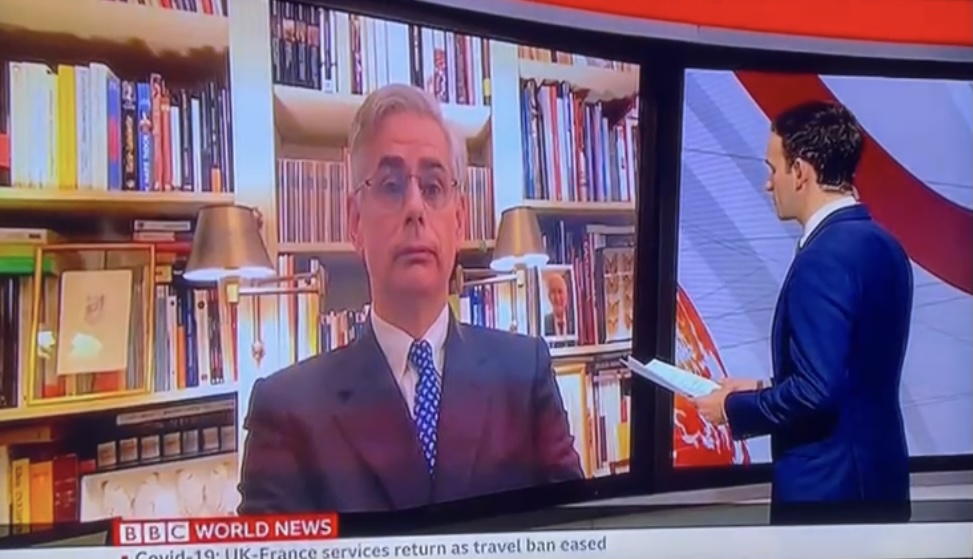
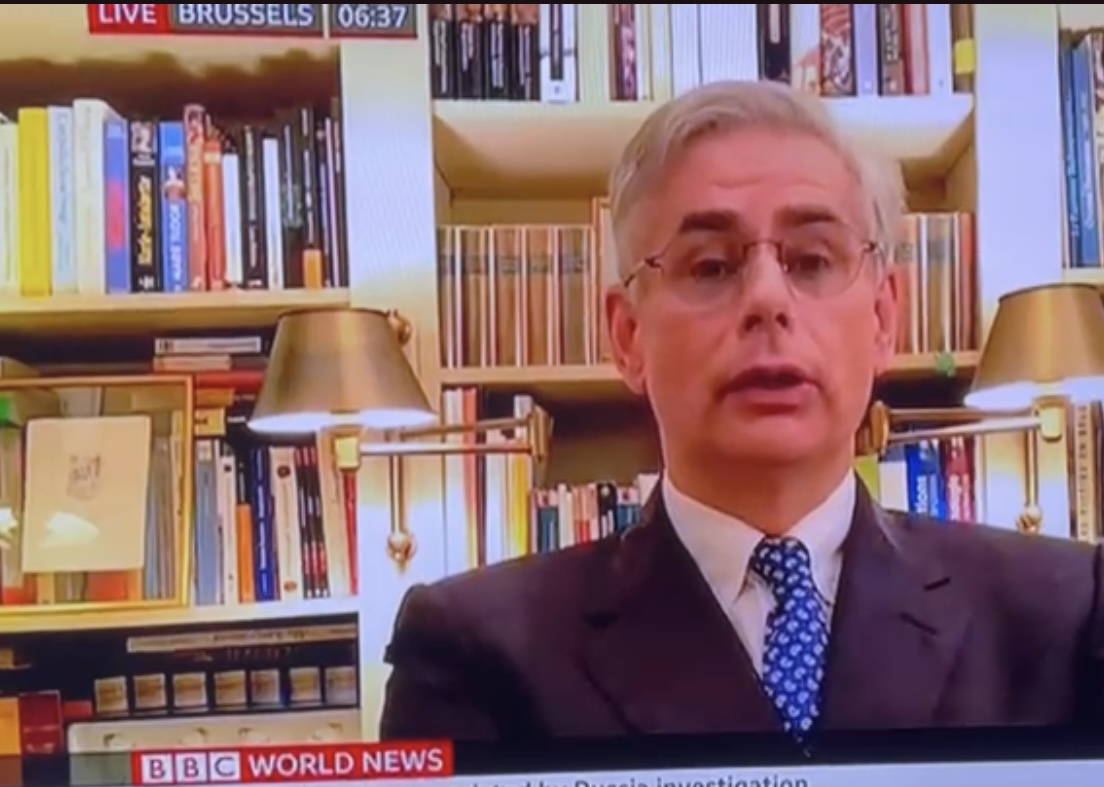
Freshfel Europe assists sector & institutions on fresh produce logistics challenges to cope with blockages at UK exit border with the emergence of the new COVID-19 variant
As businesses were getting prepared to cope with new border constraints between the UK and the EU-27 as of 1 January 2021, major logistics difficulties were recorded during December in Kent with more than 4,000 trucks being blocked at the border due to the outbreak of a new COVID-19 variant in the UK. This outbreak led EU Member States to introduce new controls measures, going beyond the requirements of the EU decision of October 2020 setting the conditions for the mobility for essential sectors. Throughout this crisis, which implied severe distortions on trade flows especially for the supply programme for Christmas and New Year, Freshfel Europe kept close in contact with the European Commission services, Member States and also with its members in the EU-27 and in the UK. Freshfel Europe General Delegate Philippe Binard reported the fresh produce sector concerns in the Morning Business Briefing on BBC World News, BBC 1 as well as on the Morning Business Market Analysis of Bloomberg Television and Radio.

Freshfel Europe participates in Stakeholder event on Sustainable Use of Pesticides
On 19 January 2021 Freshfel Europe attended a virtual meeting held by the European Commission on the evaluation of the sustainable use of pesticides Directive (SUD) 2009/128/EC and impact assessment. The objective of this meeting was to discuss stakeholders’ views on how the current SUD Directive can be improved and to reflect on one of the targets set under the European Green Deal, which aims to reduce the use of pesticides. As part of the Better Regulation Evaluation of the Sustainable Use of Pesticides Directive (SUD) and the impact assessment of its planned revision on 18 January 2021 DG SANTE launched an online public consultation asking stakeholders and members of the public to have their say on the sustainable use of pesticides. This online consultation will remain open for responses until 12 April 2021. The evaluation of the Directive should be completed before mid-2021 and the impact assessment before the end of this year. The Commission intends to issue a draft proposal to amend the current Directive at the beginning of 2022.

Freshfel Europe responds to roadmap on ‘Contingency plan for ensuring food supply and food security’
Freshfel Europe’s policy specialists responded to the European Commission roadmap on ‘Contingency plan for ensuring food supply and food security’. The initiative has been introduced as a common action of DG Mare, DG Agri and DG Santé to 1) increase the resilience of European food supply chains in times of crises, and 2) to ensure that established practices during the pandemic may be translated into concrete contingency action to allow faster reactions to future crises. The response focused on three key areas: 1) crisis prevention including proposals for better coordination, detection and communication mechanisms, 2) actual crisis management focusing on building on experiences when developing crisis responses, and 3) communication and identification of key stakeholders as a crucial element to sustain food supply chains. The response was launched together with ESSA, The European Sprouted Seeds Association. Freshfel Europe has been actively contributing to the EU contingency plan discussions and continues to contribute to crisis management in the current COVID-19 pandemic.

Freshfel Europe participates in development of EU Code of Conduct
Since December 2020 Freshfel Europe has been participating in the development of the European Commission initiative ‘Code of Conduct for Responsible Business and Marketing Practices’ under the European Green Deal and Farm to Fork Strategy. In December 2020 Freshfel Europe Director Sustainability and Health Nicola Pisano participated in preliminary stakeholder dialogue on the objective and contents of the new Code, following which Freshfel Europe submitted detailed input on the Associations expectations of such a Code. The European Commission is running a fast-tracked development of the Code of Conduct, intending to have first signatures by the end of June 2021 for presentation of the Code of Conduct at the UN Food Systems Summit scheduled for September. In January 2021 Ms Pisano represented Freshfel Europe at the Commission’s official high-level launch of the Code of Conduct. Over the coming months Freshfel Europe will continue to actively contribute to the stakeholder consultation process.

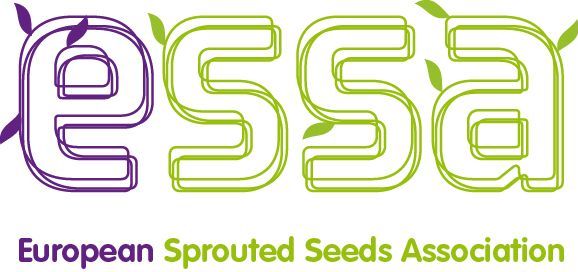
EU-level crisis management coordination discussed with European Commission
As a result of the joint Crisis Management Event organised by Freshfel Europe and ESSA (European Sprouted Seeds Association) on 2 September 2020, the two associations had an opportunity to discuss with the European Commission the possibility to establish a Working Group on Crisis Management involving actors from private businesses, the European Commission and the EU Member States. Following a constructive discussion with the European Commission services it was concluded that the current framework of DG Sante does not permit the establishment of a Working Group meeting with such a format. However, the European Commission guaranteed to stay in close contact with the fresh produce sector and will attend internal meeting on crisis management and prevention as well as aiming to involve the EU Member States when appropriate. The long-term vision of the organisers of the 2020 Crisis Management Event was to foster cooperation between stakeholders to better manage potential future crises in the agri-food sector with a view to further developing effective crisis strategies and raising awareness of crisis management good practices. The two associations will now develop internal strategies on how to progress on this topic by also involving other associations from relevant sectors.

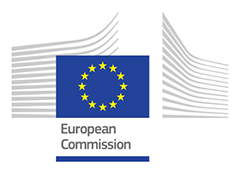
Fresh produce business opportunities in the upcoming MFF under the lead of DG INTPA
Freshfel Europe actively participated in the consultation launched by DG INTPA (ex DEVCO) of the European Commission to discuss the next cycle of development cooperation programs under the 2021-2027 Multiannual Financial Framework (MFF). The new investment opportunities will be widely influenced by the European Green Deal and the Farm to Fork Strategy and a greater coordination under the ‘Team Europe’ scheme. Given the global dimension of fresh fruit and vegetables supply chains and the strong links in particular with developing countries, Freshfel Europe is shaping up its priorities to engage in this debate. Freshfel Europe’s views are structured around different areas including communication and engagement with partner countries, aid for boosting reciprocal trade (seeking training, support towards sustainability and compliance) and investment efficiency without leading to trade distortions. Looking more specifically at Africa, fruit and vegetables trade is a good example of the already important existing trade flow with imports into the EU representing 4.2 million T (ca 30% of all EU import), and about 600,000 T of EU export (corresponding to 15% of EU fruit and vegetable export).

Freshfel Europe contributes to consultation on facilitating rules of IMSOC & highlights importance of interception notifications for the sector
Freshfel Europe has responded to the public consultation on facilitating rules for the use of the IMSOC system. With the Official Control Regulation 2017/625 having become fully operational in December 2019 with certain clauses following in December 2020, the European Commission has started to review some of the provisions and to cut red-tape. These amendments included the introduction of rules for export and re-export procedures in the TRACES system. Re-export procedures are a very specific trading practice of the fruit and vegetable sector, which lacks a set of functional rules to progress without disruptions. Freshfel Europe has taken the opportunity of the deletion of duplication of procedures for interception notifications in Europhyt and in the CHED-PP to remind the European Commission that nonetheless the sector will still need a solution on how to continue information sharing on interception notifications with stakeholders to maintain the self-responsibility of the industry to respond to arising biosecurity threats.

Freshfel Europe conducts initial evaluation of Brexit impact on the fresh fruit & vegetables sector
With ‘Brexit for businesses’ starting from 1 January 2021, Freshfel Europe continues supporting its members in their adaptation to the many changes they are experiencing in their operations as well as to prepare for new requirements to come as a result of the gradual implementation of UK border control checks for SPS and customs. In order to assist these efforts, Freshfel Europe is offering bilateral support to its members and continues to update its Freshfel Europe Q&A Brexit Factsheet, which contains a comprehensive set of questions and answers for fruit and vegetables operators working with the UK. The 7th Edition of this factsheet will be circulated to all members next week. Freshfel Europe’s Trade Director Natalia Santos-Garcia has also prepared an ad hoc briefing for members to highlight the most relevant aspects of the last minute concluded EU-UK Trade and Cooperation Agreement and participated in a meeting with the Commission’s DG TAXUD to clarify issues related to rules of origin.
In parallel, Freshfel Europe has made an initial evaluation of Brexit’s impact on the European fresh produce sector. Freshfel Europe estimates the economic impact of Brexit at around €400 euros per truck on average due to additional customs and related costs, such as fees for customs agents, as well as additional logistics/forwarding costs, and internal administration. Overall, the total annual increase of charges for EU fresh fruit and vegetable exports to the UK can be estimated at €55 million, although with the introduction of SPS certifications and controls expected in April and July, the full impact of Brexit is yet to be felt by the sector.

Freshfel Europe urges Trade Commissioner for swift solutions to secure EU fresh produce exports to India
In the month of January Freshfel Europe continued to liaise with the European Commission in order to find solutions to the introduction of a new non-GMO certification for imports in India. In a letter to the EU Executive and Trade Commissioner Vladis Dombrosk Freshfel Europe called for a prompt solution on the requirement of the new Indian Order requesting upon import non-GM certification for several fresh produce. This Order, due to enter into force on 1st March, will introduce unnecessary red tape with the requirement of non-GM certification for EU fresh produce imported into India. None of the targeted products are authorized for GM production in the EU making the requirement irrelevant and burdensome. In the letter, Freshfel Europe urged the Commission to find swift solutions in their negotiations with Indian counterparts, and to raise the issue at the upcoming February High Level Meeting between the EU and India. Freshfel Europe Trade & Market Access Director Natalia Santos-Garcia Bernabe raised this issue in the latest meeting of the Market Access Advisory Meeting with DG TRADE. Freshfel Europe additionally continues to bilaterally engage with DG AGRI and DG TRADE to highlight the concerns of EU exporters about the lack of certainty on the implementation of the rule, the unnecessary burden it represents for exporters, and the disruption is it creating in a crucial moment of the export season, particularly for apples.

Freshfel Europe contributes to revision of Packaging & Packaging Waste Directive
In January 2021 Freshfel Europe submitted its response to the European Commission’s public consultation on the revision of the Packaging and Packaging Waste (Directive 94/62/EC). Freshfel Europe Director Sustainability and Health Nicola Pisano has coordinated Freshfel Europe’s response to the revision stakeholder consultation process, which is primarily focused on reinforcing the Directive’s Essential Requirements to prevent over-packaging and facilitate reduction in packaging across all sectors for increased product sustainability. Packaging has many functions in the fresh produce sector, including product containment, shelf life extension, waste/spoilage prevention, microbiological contamination prevention, product information display, consumption promotion and facilitation as well as to boost consumer confidence for healthy diets. Furthermore, on 28 January 2021 Ms Pisano took part in the European Commission stakeholder workshop on over-packaging as part of the revision stakeholder consultation. During the workshop Ms Pisano emphasised Freshfel Europe’s perspective in discussions that EU harmonisation of measures was essential to prevent disruption of intra-EU trade and imports from third countries, sustainable packaging materials should not be penalised by policy banning packaging types regardless of their material, and that policy coherence should be maintained with the recently adopted Single-use Plastics Directive (Directive (EU) 2019/904).

Freshfel Europe participates in seminar at Universidad Politecnica de Valencia on food safety & quality
On 16 December 2020, Freshfel Europe’s Director Food Qualtiy Egle Baecke and Director Trade Natalia Santos-Garcia Bernabe moderated a seminar for master students specialized in agronomy organized by Universidad Politecnica de Valencia. The session focused on the EU regulatory approach on food safety and quality standards, particularly in relation to the authorization and registration processes of plant protection products. During their interventions, they also discussed with students the potential implications of the European Green Deal and Farm to Fork Strategies on the future of EU regulations and European production.
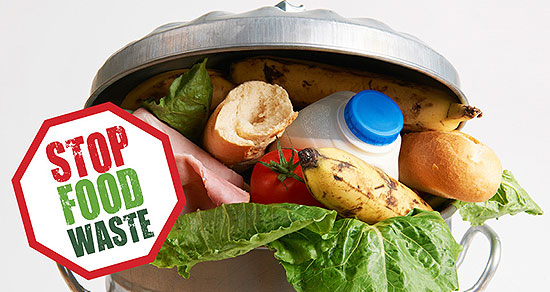
Freshfel Europe attends 9th Meeting of EU Platform on Food Loss & Food Waste
On 10 December 2020 Freshfel Europe Director Sustainability and Health Nicola Pisano attended the 9th Meeting of the EU Platform on Food Loss and Food Waste. The virtual meeting gathered stakeholders to discuss the implementation of the Farm to Fork Strategy, date marking in light of the upcoming revision of Regulation (EU) No 1169/2011 and food waste prevention in food services and hospitality during the COVID-19 pandemic. Under the Farm to Fork Strategy the European Commission has tasked the EU Platform to continue its work on EU harmonisation of food loss and waste prevention and reduction in proposing EU-level targets for food waste reduction by 2023 and revising EU rules on date marking by Q4 2022. Consequently it was announced during the meeting that the Platform’s mandate has been extended beyond its current expiration of 2021 to permit this work. During the meeting the EFSA Panel on Biological Hazards shared its recent scientific opinion on ‘Guidance on date marking and related food information’ to kick off EU-level discussions on ‘use by’ and ‘best before’ labels. This dialogue was followed by Platform stakeholders sharing hospitality and food service best practices in food waste prevention. During the COVID-19 pandemic many businesses have stepped up action to limit food waste during this exceptional time when food supply and demand has unpredictably fluctuated.

‘Conference on organic agriculture in developing countries attended by Freshfel Europe
On 27 January 2020 Freshfel Europe took part in an online conference on organic agriculture in developing countries entitled ‘A realistic pathway? Evidence from long-term systems research’ organised by European Commission Directorate-General for International Cooperation and Development. The results of 12 years of comparative farming systems research in Kenya, Bolivia and India provide scientific evidence on economic and ecological sustainability of organic and conventional systems. They illustrate how organic systems and other agroecological approaches can contribute to the Sustainable Development Goals (SDGs) by 2030. The 2030 Agenda for Sustainable Development and the 17 SDGs aim to end poverty and other deprivations. There is substantial evidence illustrating that dominant agricultural management practices are not sustainable for the future. Organic agriculture is proposed as an alternative, but its performance under tropical conditions is questioned as long-term studies are scarce. The conference addressed whether organic agriculture is a realistic pathway for smallholders in the Global South and if it can support the transformation of food systems. Furthermore, it addressed some key issues of the SDGs such as responsible consumption and production as well as eliminating poverty and hunger. The report ‘What is the contribution of organic agriculture to sustainable development? A synthesis of twelve years (2007-2019) of the long-term farming systems comparisons in the tropics (SysCom)’ was launched and the results presented at the conference. Finally, the results were reflected in the view of the Committee on World Food Security (CFS) with regards to its work on agroecology.
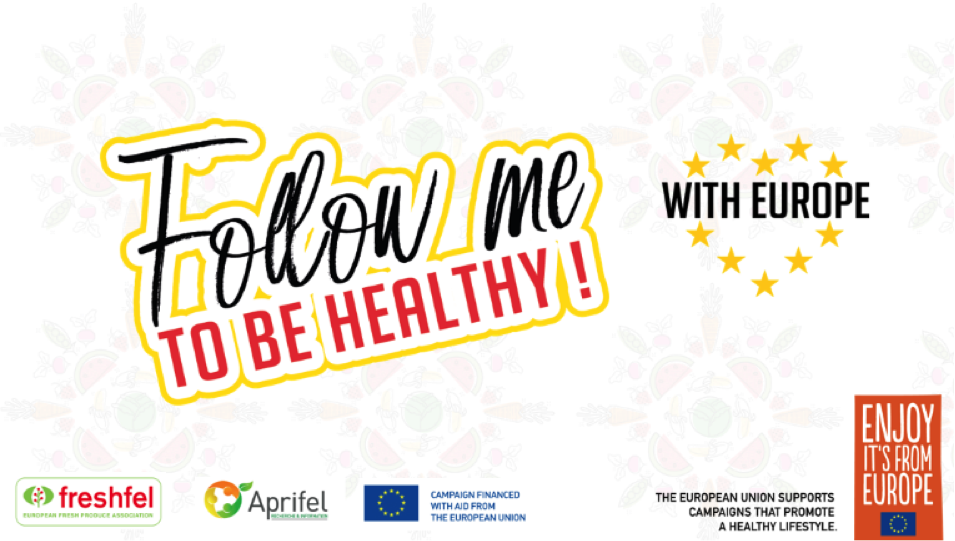
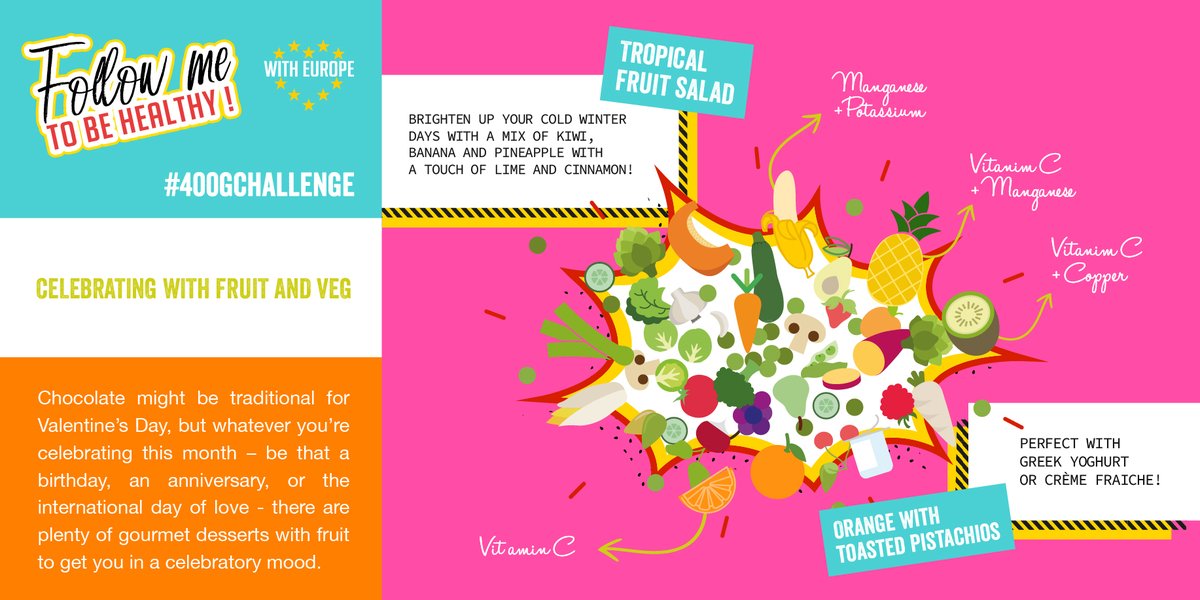
The ‘Follow me to be Healthy with Europe’ campaign enters its third & final year
The “Follow me to be Healthy with Europe” campaign, launched by Freshfel Europe and Aprifel and co-funded by the European Commission, continues to encourage young Europeans to increase their consumption of fruit and vegetables to a minimum of 400g a day in its third and final year in 2021. This year several high-profile European social media influencers will be involved in the promotion of the campaign, including Spaniard Carlos Rios, German Denise Schuster, Italian Luisa Ambrosini, Polish lifemanagerka and French Clemfoodie and Gaëlle Prudencio. These partnerships aim to show the participants of the campaign’s #400gChallenge that eating a diet high in fruit and vegetables is not only healthy but also delicious, easy to achieve and fun to experiment with. The followers of the campaign are ‘challenged’ to include more fruit and vegetables in their daily diet. These challenges are promoted by monthly infographics, tips, and videos, which showcase the health benefits of fruit and vegetables in an engaging and relatable format across the campaign’s six social media channels. You can join the #400gChallenge today by following us on Facebook, Twitter, Instagram or visiting the official website of the campaign.
